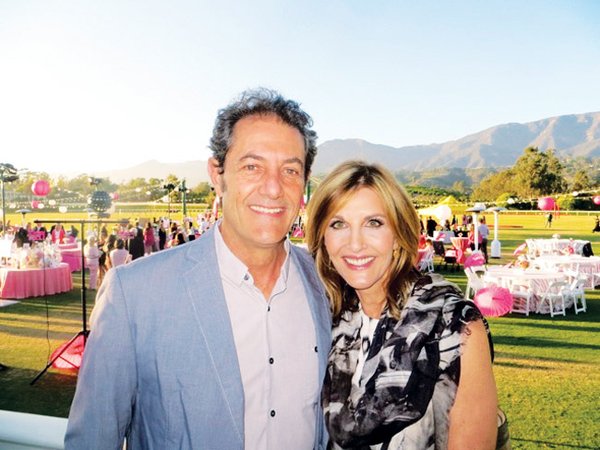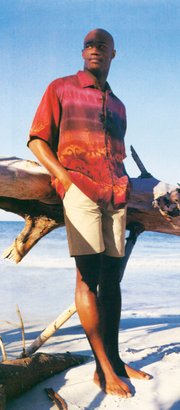TOMSON BUYS SOLITUDE
Legendary Surfer Shaun Tomson Buys Back Solitude Label From Oxford
World-champion surfer Shaun Tomson, who started up the apparel line Solitude in the late 1990s, has bought back the surfwear label he sold to Oxford Industries nearly 10 years ago.
In an interview, Tomson acknowledged he wrapped up the deal at the end of January and is shooting to relaunch the brand in spring 2015. He declined to reveal the purchase price.
The newest edition of Solitude will be designed by Tomson’s wife, Carla Tomson, who was the designer of the menswear label sold to Oxford Industries in 2005 and distributed exclusively through JCPenney Inc.
Under Oxford Industries—whose other labels include Ben Sherman, Tommy Bahama and Lilly Pulitzer—the surfwear line launched in February 2006 in 500 JCPenney stores. Men’s cotton woven shirts sold for $42 to $45, and linen and microfiber shorts fetched $38 to $50. The Tomsons had a contract to stay on for three years after the purchase, but early on in their contract, a family tragedy hit, which put a damper on their participation in the brand.
By 2009, Oxford Industries shuttered the label, citing Securities and Exchange Commission documents that the impairment charges to exit the Solitude business and other non-Solitude costs were $8.1 million.
The label has been dormant ever since.
Tomson, who has written several books, is a motivational speaker and is also a senior associate with apparel-company adviser Walter Wilhelm Associates, said he and his wife are deciding how to go forward with the surf-inspired label, which will have clothing for both men and women.
“We have the hard decision of deciding where we want to position and sell ourselves,” said Tomson, who is originally from South Africa and won the IPS World Championship in 1977. “We are definitely looking at a premium brand.”
In January, Tomson attended Surf Expo in Orlando, Fla., to check out the surfwear scene and touch base with some of his old retail clients.
The line was carried by many surf shops up and down the California coast as well as around the United States. Jeremy Woodul, floor manager at Surf-n-Wear’s Beach House in Santa Barbara, Calif., said the line was a solid brand that sold to a middle-aged guy who could afford the higher price points. “It was not for the kids, which was nice because there was nothing out there for the middle-aged guy. All the surfwear out there was youthful in the cuts and prints. Solitude was classier and age appropriate for surfers in their 30s, 40s and 50s,” Woodul recalled.
Channel Islands Surfboards, which has stores in Santa Barbara and Los Angeles, carried the line from its inception until it was sold to Oxford Industries in 2005. Scott Martinson, who was the retail manager and buyer at the time, liked the line for the different fabrics that made it stand out from other menswear lines. “The quality and craftsmanship were there. It set itself apart from what we were carrying, but it was high-end quality and comfort. We were a little sad when it went to Oxford Industries.”
When Solitude started in 1998, the Tomsons were using high-end fabric from Italy and other countries for their beach-oriented line, which had men’s woven shirts retailing for $75 to $150. It was stocked by Nordstrom and Bloomingdale’s.
When Shaun Tomson talks about the beginning of the line, he remembers walking along a deserted beach on an offshore island, 90 miles from 14 million people, and what captured the moment for him was the feeling of solitude. “That day was a genesis for our company,” he recalled. He wanted to create clothing for people who had the same attraction to the ocean and the need to get away from the pressures of the modern world as he did.
In the beginning, the line was cut and sewn in Los Angeles and Orange counties. Later, production shifted overseas. But quality was always the company’s main concern. “We were the first in the surf market to use Modals, Tencels and have digitally printed boardshorts. We believed 15 to 20 years ago that sustainability was really important,” Tomson said.
Message in a brand
The brand’s success was not only because of good design and premium fabrics but also because there was a message behind the label.
It was a message carried forth by Tomson, an introspective surfer who has written about courage, achieving goals and supporting the environment. He stands behind his message as a board member of the nonprofit Surfrider Foundation, an environmental group whose goal is to keep the oceans and beaches clean. In 2003, the Surf Industry Manufacturers Association named Tomson as its “Environmentalist of the Year.”
“While profits and sales are good, you need to stand for something,” the world-class surfer said. “Everyone in their lives is so busy. We are busier and busier every day. While technology has been great, it has created a 24-hour, seven-day-a-week cycle. We want to convey the concept in our clothes of people taking time for introspection and solitude and how it affects their ethos.”
Tomson tries to convey those ideas in his motivational speeches to corporate groups and in his talks to schoolchildren. The Montecito, Calif., resident travels around the world, talking to executives about imparting the power of positive living, making a difference, and commitment to your community and your business.
After his 15-year-old son died in 2006 playing the “choking game,” a game in which kids asphyxiate to get a brief high, Tomson began sharing his thoughts with students, teaching them to think twice before they do something because it was a lesson he never got to teach his own son.























